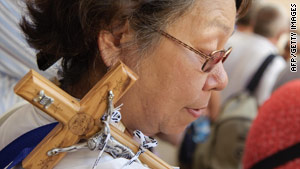Italy vows to fight for classroom crucifixes

- Italy vows to fight European court ruling banning crucifixes in classrooms
- Court ruled Tuesday that display of religious symbols violate students' right to freedom of religion
- Case was brought by an Italian woman who objected to crucifixes on walls in her sons' classrooms
- Government says it will appeal verdict; leading Catholics express surprise, anger
ROME, Italy (CNN) -- The Italian government is vowing to fight a European court ruling that crucifixes in classrooms violate students' right to freedom of religion.
The European Court of Human Rights found unanimously Tuesday that the display of a particular religious symbol -- such as the Christian cross -- in a classroom "restricted the right of parents to educate their children in conformity with their convictions, and the right of children to believe or not to believe," a court statement said.
The case was brought by an Italian woman, Soile Lautsi, who objected to the crucifixes on the walls in her two sons' classrooms.
Italian courts had ruled earlier that the cross was a symbol of Italy's history and culture, prompting Lautsi to take her case to the European court in Strasbourg, France.
It awarded her 5,000 euros ($7,400) in damages Tuesday.
The Italian government said it would appeal the European Court's verdict and leading Catholic figures expressed astonishment and anger.
The ruling "is cause for bitterness and many perplexities," the Italian Conference of Bishop said in a written statement.
The bishops said they were still studying the ruling, but it appeared to result from "ideological bias" and a lack of understanding of "the multiple significances of the crucifix."
"It does not take into account the fact that in Italy the display of the crucifix in public places is in line with the recognition of the principles of the Catholicism as 'part of the historical patrimony of the Italian people,' as stated in the Vatican/Italy agreement of 1984," the bishops said.
The Vatican in Rome, which has been the seat of the Catholic Church for most of its 2,000-year history, did not officially respond to the ruling.
But Cardinal Giovanni Battista Re told the leading Italian daily La Repubblica he could not understand it, and that no one with common sense could have expected it.
"When I think that we are talking about a symbol, the crucifix, an image that cannot but be the emblem of a universally shared humanity, I not only feel disappointed but also sadness and grief," he said.
"The crucifix is the sign of a God that loves man to the point of giving up his life for him. It is a God that teaches us to learn to love, to pay attention to each man ... and to respect the others, even those who belong to a different culture or religion.
"How could someone not share such a symbol?"
Italy has three months to file a request for a new hearing, court spokesman Stefano Piedimonte told CNN. A five-judge panel will examine the request, officially known as a referral, to determine if it raises sufficiently important issues for a 17-judge Grand Chamber hearing.
Only the Italian government can appeal the verdict, but other interested parties can file briefs if the case goes forward, Piedimonte said.
The European Court of Human Rights was set up in Strasbourg by the Council of Europe Member States in 1959 to deal with alleged violations of the 1950 European Convention on Human Rights.
CNN's Hada Messia in Rome contributed to this report.
